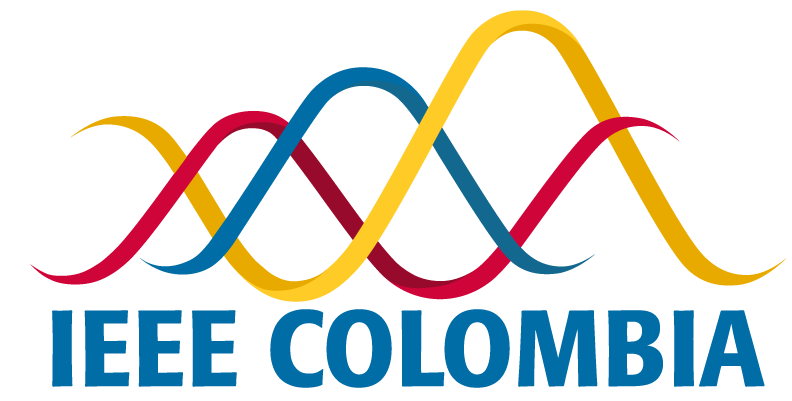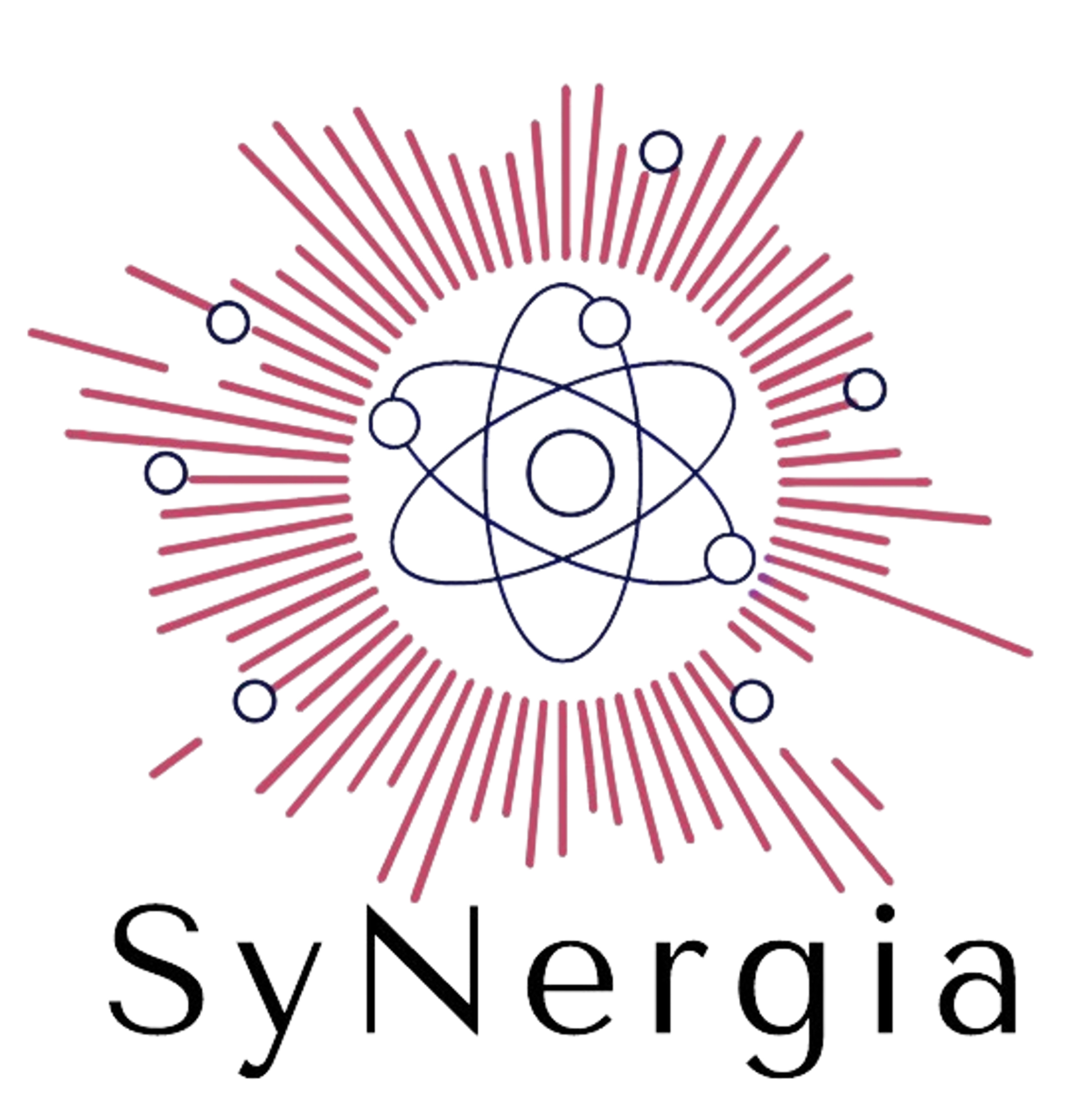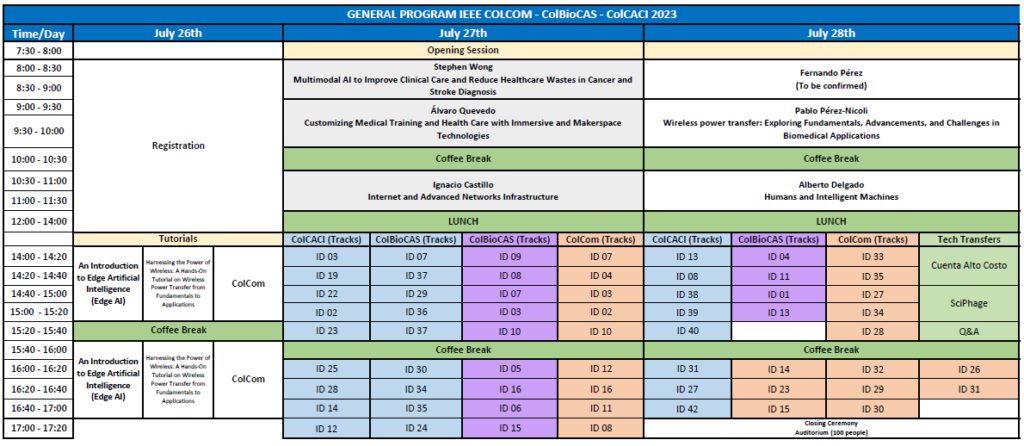IEEE Colombia has chosen Bogotá D.C. as the venue for the IEEE Colombian BioCAS Workshop 2023 - IEEE ColBioCAS 2023. This workshop is one of the key events of the IEEE Colombian Chapter of the Circuits and Systems Society and IEEE Engineering in Medicine and Biology Colombian Chapter that aims at presenting the progress and development of the academic, scientific, and industrial usage of bioengineering technologies for monitoring, controlling, and aiding biological systems, ecosystems, crops, and the human body. The workshop is organized in conferences and mini-courses with experts, and the exchange of ideas and solutions proposed by researchers, students and professionals
We hope that government, academy, and industry will take active participation in IEEE Colombian BioCAS Workshop 2023. Papers will be reviewed by technical committee under the IEEE standard procedure. Accepted papers must be presented in oral sessions, which is mandatory to be submitted for publication in the conference proceedings (IEEE Xplore database, including ISBN).
Organizing Committee
Conference Chair
Diana C. Rodríguez
Escuela de Medicina y Ciencias de la Salud, Universidad del Rosario

Publications Chair
Faruk Fonthal
Universidad Autónoma de Occidente
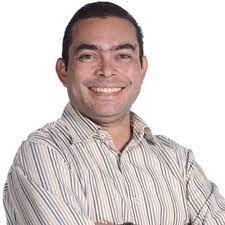
Program Chair
Jorge Iván Marín Hurtado
Universidad del Quindio
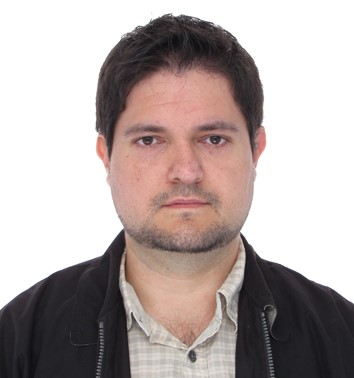
Important Dates
Extended Dates!
March 24th, 2023 April 14th, 2023 April 24th, 2023 April 24th, 2023 April 30th, 2023 May 26th, 2023June 23th, 2023 July 7th, 2023
Submission Guidelines
We invite authors to submit high-quality full papers reporting original and novel research results on the following topics not limited to:
Papers should be written in English or Spanish (but at least the abstract MUST be in english), unpublished and not submitted elsewhere. Full papers must be formatted as the standard IEEE double-column conference template and submitted exclusively using the EasyChair link https://easychair.org/conferences/?conf=ieeecolbiocas2023 . Maximum 6 pages are allowed for each paper, including all illustrations and references.
Keynote Speakers
Multimodal AI to Improve Clinical Care and Reduce Healthcare Wastes in Cancer and Stroke Diagnosis
Abstract: The healthcare industry today is under siege to address growing macroeconomic and socioeconomic challenges including high costs and low quality, increasing federal regulations, patient expectations, health inequities, and provider consolidation. For example, healthcare waste alone constitutes 25-30% or about US $1 trillion of the annual healthcare spending in the United States. To increase efficiency and accessibility, artificial intelligence (AI) has recently been used in automating business, administrative, billing, and scheduling processes in eliminating mundane, repetitive tasks performed by humans. But can we use AI to address the clinical tasks that often involve interpreting large amounts of multimodal patient data and require clinicians’ cognitive capabilities to perform non-routine tasks and to enhance human decision-making performance - or even beat the clinicians’ performance? This presentation describes two clinical use cases on investigating, applying, and implementing cognitive automation in reducing unnecessary biopsies of breast cancer due to overdiagnosis and improving e-triage, detection, and diagnosis of Stroke developed and validated at Houston Methodist. We adopted a multi-modal AI strategy and designed the solutions to fit into existing clinical workflow. We also hope to engage a meaningful conversation on the possibility of cognitive automation in medicine. If cognitive automation is successful in medicine, it begs the question that what would be the future role of physicians and the patient-physician relationship and patient experience?
Stephen Wong
With three decades of research, product development, and executive leadership experience in industry and academia, Dr. Stephen Wong’s many achievements include leading teams that: automated the first VLSI DRAM chip production (Bell Labs), created the nation's first hospital-integrated picture archiving communication system (UCSF), implemented the largest radiology information system in Europe (Philips Healthcare), produced the largest web trading platform (Charles Schwab), pioneered high content screening and analysis for drug discovery (Harvard), and developed new computational approaches for image-guided therapy and digital medicine (Houston Methodist). Currently he is the John S. Dunn, Sr. Presidential Distinguished Endowed Chair, the Founding Chair of Systems Medicine and Bioengineering Department, the T.T. and W.F. Chao Center for BRAIN, and Translational Biophotonics Laboratory at Houston Methodist Research Institute; Associate Director, Houston Methodist Neal Cancer Center; Chief of Medical Physics, Houston Methodist Hospital; and Professor of Radiology, Neurosciences, Pathology and Laboratory Medicine, Cornell University. Wong received his Ph.D. in Computer Science from Lehigh University and senior executive education from Stanford University, MIT, and Columbia University. He is a Fellow of IEEE, AIMBE, AMIA, and AAIA, and a licensed professional engineer. He has lived in and continues to work across various continents--including North America, Europe, Asia, and Australia/Oceania.

Customizing Medical Training and Health Care with Immersive and Makerspace Technologies
Abstract: Immersive and makerspace technologies are gaining momentum as suitable tools in the health sciences domain. Whether for teaching, training, or health care, these technologies are presenting opportunities for complementing traditional techniques. While these technologies allow creating and recreating scenarios otherwise impossible in real life, their current democratization is enabling research and development into creating novel and engaging forms of training and health care applications. This presentation provides an overview of current trends and opportunities pertaining to the use of immersive and makerspace technologies in medical training and health care, presenting some use cases associated with the use of virtual and augmented reality and 3D printing in procedures such as an eye examination, the cricothyroidotomy, breastfeeding, exergames, and reminiscence therapy
Alvaro Joffre Uribe Quevedo
Alvaro Joffre Uribe Quevedo is an Assistant Professor in the Faculty of Business and Information Technology at Ontario Tech University in Oshawa, Ontario, Canada, where he teaches courses associated with immersive technologies, computer graphics, and game engines in the Game Development and Interactive Media Undergraduate program. He also teaches immersive technology courses in the Computer Science graduate programs and conducts research in Virtual Reality and Human-Computer Interactions. Recent projects include understanding the usability effects of physical and physiological measurements in VR in various use cases including VR locomotion, radiation attenuation training, breastfeeding, reminiscence therapy, laparoscopy simulation, twin-twin transfusion syndrome simulation, and inclusive design for VR collaboration rooms, among others. Dr. Uribe Quevedo received his bachelor's degree in Mechatronics Engineering from Universidad Militar Nueva Granada in Bogotá, Colombia, in 2003. In 2008, Dr. Uribe Quevedo completed his Master’s in Mechanical Engineering, and in 2011 his Doctoral degree in the same field at the Universidade Estadual de Campinas in Campinas, São Paulo, Brazil. In 2015 he became a Post-Doctoral fellow at the Games Institute at the University of Waterloo in Waterloo, ON, Canada, researching the effects of games in medical training as part of the IMMERSe network jointly working with Ontario Tech University.
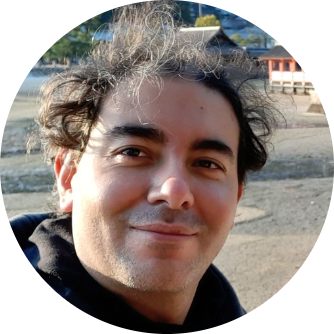
Humans and Intelligent Machines
Following Unesco recommendation on education, this talk is an introductory presentation of artificial intelligence and its current applications. From control theory problems to human data, parametric models can be trained for predictions and categorization. Nonetheless, there is a huge difference when AI is applied to people and this requires ethical principles and regulation.
Alberto Delgado
Alberto Delgado, Engineer (BEng) and Master (M Eng) in Electrical Engineering, Universidad de los Andes. PhD in Cybernetics (intelligent control), Reading University (UK). Full Professor, National University of Colombia. Currently, teaching at the Automation Program the courses, "Humans and Intelligent Machines," and "Intelligent Control."
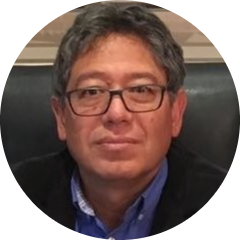
Wireless power transfer: Exploring Fundamentals, Advancements, and Challenges in Biomedical Applications
Abstract: The underlying principles of wireless power transfer (WPT) were first discovered and developed during the nineteenth century. Nevertheless, despite the remarkable contributions made by scientists and technologists like Nikola Tesla, its practical implementation in our daily lives remained limited until recently. In the field of active implantable medical devices (AIMDs), while there were earlier precedents of using WPT in the mid-20th century, the broader utilization of this technology gained significant traction in the 21st century. WPT alleviates the trade-off between battery size and lifespan, which are critical design considerations in AIMDs. Within this application, the key design considerations revolve around extending the transmission distance and increasing the transmitted power, while ensuring compliance with safety regulations. In this presentation, we will explore the fundamental aspects and ongoing design challenges associated with WPT links for biomedical applications. We will delve into the involved circuits and magnetic links, approaching the topic from a comprehensive system-level perspective.
Pablo Pérez-Nicoli
Pablo Pérez-Nicoli received his bachelor's degree in electrical engineering in 2013 and the Ph.D. degree in 2018 from the Universidad de la República, Montevideo, Uruguay. He joined the Electrical Engineering Department of the same university in 2012, where he currently holds the position of Assistant Professor. His research endeavors revolve around wireless power transmission and the design of ultra-low-power analog integrated circuits. He has made contributions to the field, authoring numerous papers and a book titled "Inductive Links for Wireless Power Transfer: Fundamental Concepts for Designing High-efficiency Wireless Power Transfer Links," which was published in 2021 by Springer.
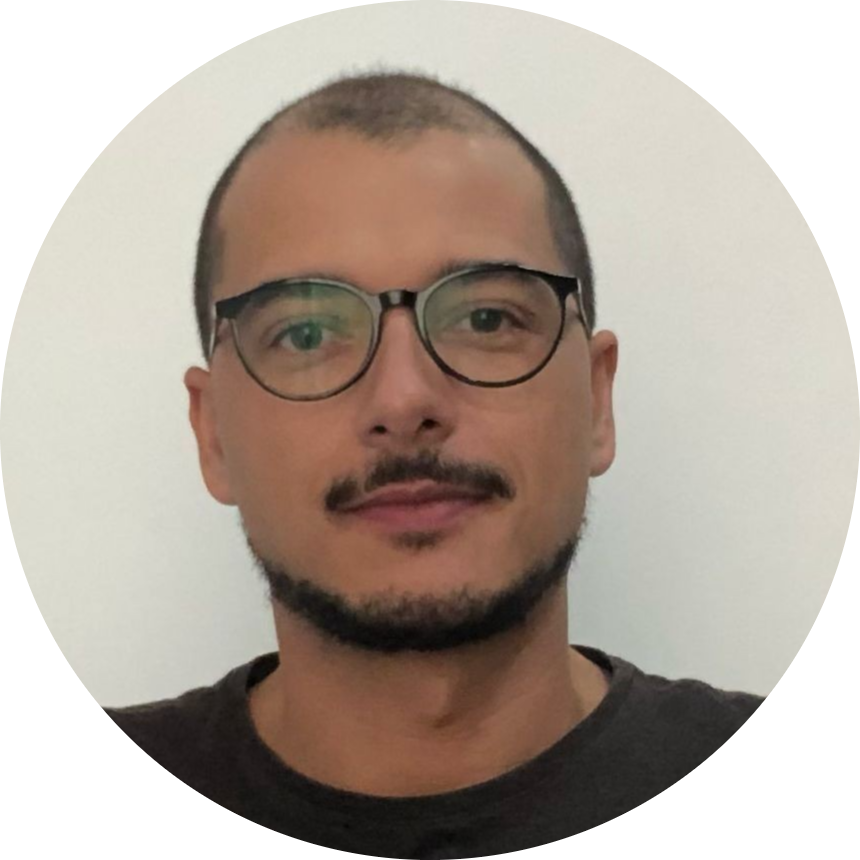
Tutorial: Harnessing the Power of Wireless: A Hands-On Tutorial on Wireless Power Transfer from Fundamentals to Applications
This tutorial aims to equip the audience with a comprehensive understanding of the fundamentals, design principles, and optimization techniques in the rapidly evolving field of Wireless Power Transfer (WPT), with a specific focus on biomedical applications. The tutorial transitions from theoretical foundations to practical aspects, providing participants with a hands-on learning experience. A standout feature of this tutorial is the opportunity for participants to directly explore and apply the presented concepts using calculation scripts and electrical simulations with the provided LTspice schematics. This tutorial is based on the book: “Inductive Links for Wireless Power Transfer: Fundamental concepts for designing high-efficiency WPT links” by the speaker, recently published in 2021 (Springer). Join us in this enlightening session to gain practical insights and delve into the exciting world of wireless power transfer for AIMDs.
Internet and Advanced Networks Infrastructure
Abstract: For the evolution of commercial Internet, the Internet 2 in all the world, known as Advanced Networks or National Research and Education Networks (NREN) look for the evolution of the next generation Internet developing protocols and letting those huge international projects be a result of an intense international collaborations. The advanced network infrastructure is installed and managed directly by ISP companies but coordinated by regional consortiums formed by universities and research centers. This talk also shows the state of regional advanced networks infrastructure including the interplanetary Internet and the state of the research for the advanced networks in the world.
Ignacio Castillo
Ignacio Castillo has been working for 27 years in telecommunications and computer industry and academia in 110 national and international projects, as team member or leader on technical and management positions in internet networks, data centers and engineering management. His interest: Internet networks, Datacenters & Eng. management. In industry he worked for DICI, IFE, REDUNO-TELMEX and DATACENTER DYNAMICS, being now an independent consultant. In academia he is a full-time professor-researcher at Autonomous University of Mexico City (UACM) since 2008 being Head of the Advanced Networking Laboratory. He was full time at UPAEP and UTM, and he was visiting professor or p time at UPS Ecuador, UDEFA (Military), UAM and BUAP. He wrote 4 books, and 50 journal and conference papers (SCOPUS h-8 index). He has lectured 140 undergraduate & graduate courses. His ADVNETLAB team developed the software UTILCON. He received 20 international and national awards and distinctions, such as: IEEE ANDESCON Best paper award 2022 and 2020, IEEE Computer Society BoG member and IEEE Senior Member. He was an IEEE Computer Society Distinguished Lecturer (2015-2017), till today, he offered 171 keynotes, invited talks and webinars, and 16 tutorials for conferences. He is volunteer for IEEE Communications Society and Computer Society. He received his bachelor’s degree in sciences degree in Electronic Sciences and his M.Sc. Degree in Electronic Devices, both from the B. Autonomous University of Puebla, Mexico.
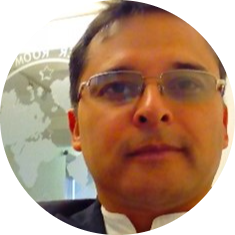
Registration
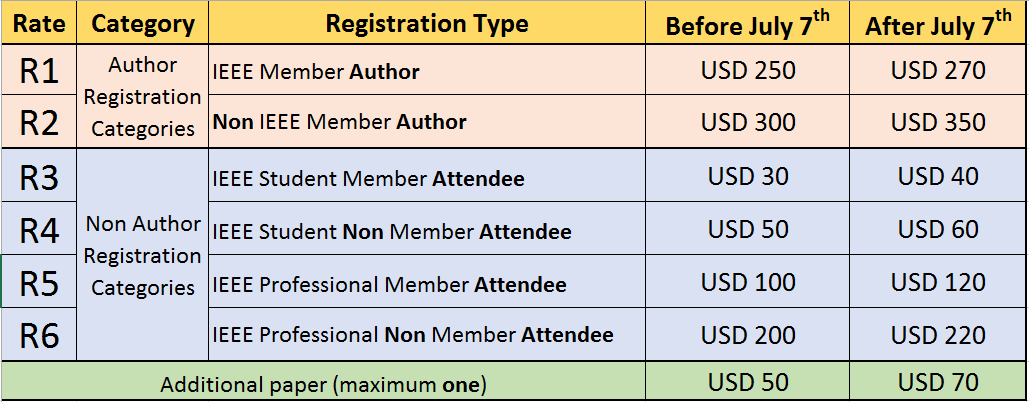
Please, follow the link to complete the registration => here
Any doubt in relation to payment bill or similar, please write to colombia@ieee.org.co .
Important Notes
Author Registration categories (R1 or R2) cover maximum one paper. Each registration has the possibility to have one paper more with an additional fee
- + USD50: before July 7th or,
- + USD70: after July 7th
- Additional page (maximum 6 pages) + USD30
Program
Support
